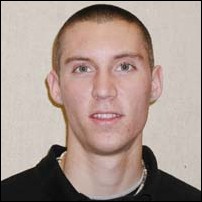It’s not the coach; it’s the system

Image: Niner fans looking for dynasty; team just wants championship:Jimmy Spencer:
February 5, 2003
In nearly every aspect of life it is essential to have cohesion between the top and the bottom.
Parents and children, bosses and employees and teachers and students must all be able to work together within an appropriate structure that suits everyone.
In sports it is no different. Varying ideologies must reach an accord suitable for the program, so that players, coaches, administrators and, ultimately, the fans, are all pleased.
It is a difficult formula, but he is making it work.
He puts in the time. He holds an “open-door” policy with all Hornet athletes. He masks his constant evaluations with a certain encouraging smile that makes others confident that everything is going to be all right.
Sacramento State Athletic Director Terry Wanless appears gracious on a personal level. He masters an articulate form of communication. An easing voice used to soothe disgruntled fans or the occasional troubled players.
Sure, he is a compassionate man, but that doesn’t stop him from making seemingly cutthroat decisions when necessary.
This past fall, Wanless made his first aggressive move by firing head football coach John Volek. The decision came after a 2002 season flooded with controversy and negative publicity.
But it wasn’t just the player and coaching suspensions, or even the Jay Leno pokes at Sac State that led to the former coach’s ultimate termination. It was a concoction of qualities all too wrong for Wanless’ type of program.
When deciding on coaching positions, Wanless must steer through a comprehensive evaluation to consider the right pick for Sac State’s program.
The job as A.D. here at Sac State differs from an A.D. at a powerhouse athletic school such as Stanford, Cal or Arizona. A big time atheltic school is structured according to what Wanless describes as a business model.
The business model is more likened to that of pro sports, where records and money are the only representations of success.
As Wanless describes it, “If you win, you keep your job. If you lose, you’re gone.”
Contrary to the business model, is what is called the educational model. This system focuses on making athletes into solid citizens by focusing on academics and sportsmanship, rather than just winning and losing.
Sac State’s formula is to draw together both the business model and the educational model. In this approach, other facets surrounding the game, particularly the development of student athletes, dilute aspects of the business model.
“Education is what we do first and if we’re doing that well, then that kind of tempers the business model part of the job,” Wanless said. “But ultimately we still must have success.”
The educational-business structure is more fitting here at Sac State since our athletic department is less focused on a win-now mentality.
We don’t need a coach focused primarily on a winning record. It would be like hiring a government finance professor to teach a third grade math class. The college professor would fail to reach students in the same way someone more suited for elementary school children would.
Not to say that a coach at Sac State should be elementary in their coaching, but our coaches must be interactive coaches, who will work with players on and off the field.
Mooshagian, most effective in his “hands-on” coaching approach, was selected to create a profound change in the program.
“It’s not a negative against the person being replaced,” Wanless said. “It’s simply that when you make a change, you want to represent that change in a variety of ways.”
For Sac State football, we needed to make a change in the way coach and player personalities were representing our school. That can be said for all Hornet programs. It becomes the coach’s responsibility to enstill a combination of sportsmanship, academic values and a winning attitude.
It all comes down to finding the right fit for the system.
Bay Area sports teams have recently shown the importance of harmony between a coach and upper management. Steve Mariucci, Jon Gruden, Art Howe and Dusty Baker are known as a few of the best coaches in pro sports. Still, all of these men were let go from their former franchises because of their differences within a desired structure.
There must be commonalities through every rung of an organization, and if ideological disparity emerges, the axe is swung.
The principles in which decisions are made at Sac State are what make us different from many other Div. I schools.
We are the mom and pop restaurant hidden within the scattered chains of Applebee’s and McDonalds. We hold ethics above dollars and player development over total wins.
This past fall, changes were made to a football program marred with distasteful conduct.
When our administrators, coaches and players are all on the same page, it allows programs to operate on all cylinders.
In a sports world filled with greed, putting moral values at the forefront is something we at Sac State should be proud of.
To respond to Jimmy Spencer’s column, please send e-mail to [email protected]
























































































































